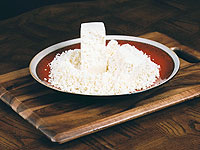Cotija
Analytical:
- Moisture38% - 42%
- Salt3.3% - 5%
- pH5.2 - 5.6
- Fat27% - 32%
- FDB45% - 50%
Microbiological:
- Yeast/Mold0/g
- E.Coli<10
- Coliforms<10
- Salmonella0
- Staph0
- L.Moncytogenes0
- Lactobacilli0
Nutritional Information (per 28 grams):
- Calories100
- Calories from Fat70
- Total Fat8 g.
- Saturated Fat4 g.
- Trans Fat0 g.
- Cholesterol30 mg.
- Sodium200 mg.
- Total Carbohydrates<1 g.
- Dietary Fiber0 g.
- Sugars0 g.
- Protein7 g.
- Vitamin A6%
- Vitamin C0%
- Calcium20%
- Iron0%
Ingredients:
Pasteurized milk, cheese cultures, salt and enzymes
Packaging:
- 40 lb. block
- 5 lb. loaf
- Retail cuts
Shelf Life:
- 40 lb. block180 days
- 5 lb. loaf180 days
- Retail cuts180 days
Temperature Requirements:
Cotija is a dry, firm, crumbly cheese with a sharp, robust flavor. Cotija is described as the Parmesan of the Hispanic world.
Application and Additional Serving Suggestions:
- Very versatile in application
- Traditional application includes: crumbled over refried beans, topping for most Mexican foods and dishes
- Crumble or grate over salads, steamed vegetables
- Crumble or grate over pizza, lasagna and pasta
- Chili and other soups
- Cob corn rolled in butter and topped with grated Cotija
- As a garnish to any dish
